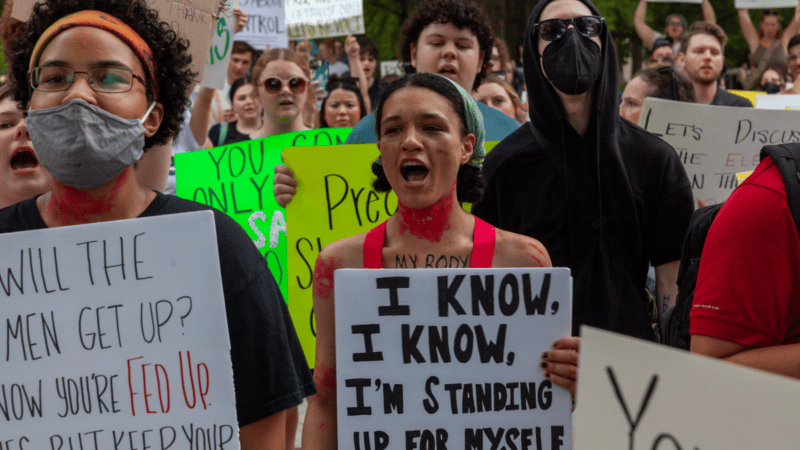Alabama leads US in ‘pregnancy criminalization’ cases following Dobbs decision: report
A crowd chants during a protest against the Supreme Court's ruling overturning Roe v. Wade on Saturday, June 25, 2022, in Birmingham.. Several hundred people massed in Linn Park for a rally organized by the Yellowhammer Fund which provides financial assistance for people seeking abortion care. (Photo by Rashah McChesney/Gulf States Newsroom - WBHM)
As prosecutors in a dozen states charged women with crimes related to their pregnancies, the Gulf South accounted for more than half of known cases, a recent study found.
The preliminary review from the legal defense and policy group Pregnancy Justice tracked such prosecutions for a year following June 24, 2022 — after Dobbs v. Jackson Women’s Health Organization, the Supreme Court decision that overturned the constitutional right to abortion.
For the period researchers examined, they unearthed more than 100 cases of prosecution in Alabama — nearly half the total — plus a handful in Mississippi. Cases also were found in several other states, including Oklahoma, South Carolina and Texas.
Most cases the group found pertained to alleged drug use during pregnancy, not abortions. But the findings help shed light on the use of criminal laws informed by the idea of fetal personhood, a legal premise gaining traction in the South.
“Fetal personhood” proponents argue that such statutes protect the rights of the unborn. The report’s authors contend that they’re used for “controlling and punishing” pregnant people.
In Alabama, “we have these women who were abusing substances while pregnant,” explains Brittany VandeBerg, a University of Alabama criminal justice professor who worked on the study. “And even if the child has no harm after they’re born, they’re still getting charged with these charges.”
VandeBerg said a call to law enforcement is sometimes initiated by hospital staff as a result of a positive drug test for someone who is pregnant or giving birth. That can set a chain of events in motion that leads to prosecution and potential imprisonment.
Her team has found that in Alabama, people being prosecuted are often poor white women from rural communities. They may be struggling with addiction but live in areas that lack resources for treatment.
She said they’re unlikely to have resources to pay bail or for a private defense attorney, and can end up sitting in jail or serving time in prison.
“I’ve spoke[n] with some law enforcement officers in these rural counties, and they have expressed their frustration,” VandeBerg said. “They say, well, we don’t want to be arresting these women.”
Limitations to the study included the “notoriously opaque” U.S. criminal justice system, which lacks centralized records across jurisdictions and states. Researchers thought their findings were likely an undercount.
While they’d identified more cases than in any previous calendar year, they could not determine definitively whether these prosecutions were occurring more frequently or if their searches were more effective — “the team suspects it may be both,” they wrote.
The report’s authors recommend investments in resources for treating substance abuse in pregnant people, rather than taking a “punitive” approach to addiction.
They also advocate for expanded privacy protections in health care settings, including drug test consent rules, and that states work to enact laws to shield people from being charged with crimes related to their pregnancies.
VandeBerg said research has continued and that they’re seeing cases pop up in new Alabama counties.She said what’s happening could prevent women from reaching out to health care services, out of fear of being reported to law enforcement.
“If our whole goal is to protect children and unborn children, I feel like this is doing exactly the opposite of what we want,” VandeBerg said.
This story was produced by the Gulf States Newsroom, a collaboration between Mississippi Public Broadcasting, WBHM in Alabama, WWNO and WRKF in Louisiana and NPR.
‘Bomb cyclone’ forecasted to bring heavy snow, blizzard conditions and dangerous travel
A 'bomb cyclone' is intensifying severe winter weather for millions of people across the U.S. The system is expected to knock out power and disrupt holiday travel.
Russia sends 3 Iranian satellites into orbit, report says
The report said that a Russian rocket sent the satellites on Sunday from a launchpad in eastern Russia.
Viral global TikToks: A twist on soccer, Tanzania’s Charlie Chaplin, hope in Gaza
TikToks are everywhere (well, except countries like Australia and India, where they've been banned.) We talk to the creators of some of the year's most popular reels from the Global South.
This painting is missing. Do you have it?
An important work from a rediscovered artist has been absent from public view since the 1970s. A New York curator is hunting for it.
Memory loss: As AI gobbles up chips, prices for devices may rise
Demand for memory chips currently exceeds supply and there's very little chance of that changing any time soon. More chips for AI means less available for other products such as computers and phones and that could drive up those prices too.
Brigitte Bardot, sex goddess of cinema, has died
Legendary screen siren and animal rights activist Brigitte Bardot has died at age 91. The alluring former model starred in numerous movies, often playing the highly sexualized love interest.








